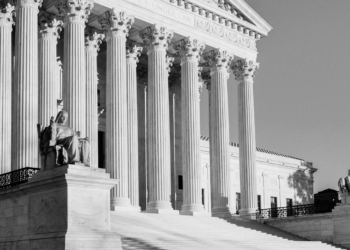If you’ve ever been peppered with unsolicited texts or TikTok DMs after a car crash, you’ve met the digital face of an old problem: barratry—soliciting legal clients the wrong way. With H.B. 2733, Texas has finally updated the law to meet the moment, closing the loopholes that let online lead-generation mills hustle vulnerable Texans under the guise of “marketing.”
This is not a gag on legitimate advertising. It’s a long-overdue curb on paid steering, deception, and high-pressure pitches masquerading as helpful outreach. The bill modernizes Texas Penal Code § 38.12—the state’s barratry statute—so that bad actors can’t hide behind a keyboard.
What H.B. 2733 Actually Does
H.B. 2733 expands criminal liability to those who solicit professional employment through electronic communications—think cold texts, DMs, and scripted “click-to-sign” funnels—and to anyone who deploys false, misleading, or deceptive online messages to drum up cases. The law already made it a crime to accept money or anything of value to solicit clients; the update makes clear that paying aggregators for digital “leads” is no safer than hiring a runner to prowl an ER waiting room.
The statute speaks plainly: an aggregator who, with intent to get paid, solicits employment for legal services “in person, by telephone, or through the use of electronic communications” commits an offense. Pair that with the prohibition on false or deceptive claims, and a lot of the industry’s sketchiest scripts just turned from “ethics problem” into “element of a crime.” And because the current law already criminalizes accepting value to solicit for another, the pay-per-lead model—where money only moves when a claimant signs—looks like a flashing red risk.
This has real teeth. Violations are a third-degree felony. On the civil side, aggregators can be sued and fined up to $10,000 under current law—with a separate bill pending the governor’s signature that could raise the cap to $50,000. That combination of criminal exposure and civil penalties changes the risk calculus in a hurry.
Why It Matters
Texas didn’t invent digital barratry; the market did. Data vendors compile “hot lists” of recent crash victims, then hustlers push templated messages that play on fear and urgency. Some posts and landing pages blur the line between lawyer ads and official government resources. Others promise “instant approvals” or imply a connection to insurers, hospitals or first responders. By the time a person realizes they’ve been steered, their contact info has been resold, their phone won’t stop buzzing, and they may have signed a contract they barely read.
H.B. 2733 targets that pipeline. It says: no more covert middlemen peddling pain for a fee; no more deceptive creatives that confuse the public; no more “sign now, think later” funnels delivered straight to a victim’s inbox while they’re still in a gown. Ethical lawyers who invest in transparent, opt-in advertising should welcome this. Texans deserve to choose counsel without being gamed by a growth hack.
What Changes for the Industry
Outbound lead-gen (calls, texts, DMs): This is now the bull’s-eye for criminal liability when aimed at signing claimants. If your business model depends on blasting accident victims, you need a new business model. Pivot to genuine inbound and verifiable opt-in channels—or get out of Texas.
Compensation structures: Paying per lead or per signed case looks like paying for solicitation. Safer alternatives include flat-fee advertising or bona-fide media buys not tied to sign-ups or intake conversions.
Advertising content: False, misleading or deceptive statements aren’t just bar-rule violations anymore; they’re elements of a crime. That means scripts, landing pages and social creatives should get real legal review, not just A/B testing.
Data vendors and list brokers: Accident-related “hot lists” implicate the existing 31-day blackout period on solicitation. Vendors should timestamp data, withhold accident-specific fields until the blackout lapses, and ditch any “act now or lose benefits” language that misleads consumers.
Attorney accountability: Lawyers who knowingly accept employment secured by illegal solicitation also commit an offense. Firms should demand robust warranties and indemnities from any marketing partner—and to audit how every lead is sourced.
Addressing the Free Speech Critique
Some will cry “censorship,” but this isn’t a ban on speech; it’s a regulation of commercial conduct long recognized as harmful. The law doesn’t outlaw advertising or keep lawyers from informing the public. It targets paid solicitation and deception—exactly where consumer protection belongs.
You can run clear, truthful ads. You can publish educational content. You can build a brand people seek out. What you can’t do is buy access to victims and push them into signing under false pretenses.
The Path Forward
For prosecutors and regulators: Enforce it. Prioritize cases with patterns of deception and volume-based harm.
For the State Bar and the courts: Hold firms responsible for their vendors—no more “we didn’t know how the sausage was made.”
For reputable marketers: Lean into opt-in, transparency and compliance; there’s still plenty of room to compete on service and information.
And for Texans, demand accountability: If you’re contacted out of the blue after an accident, hang up, don’t click. If you have signed a contract with a lawyer based on these actions, or even if you have already settled a case through an attorney utilizing these tactics, report it to the Texas Attorney General, the State Bar of Texas, or your local district attorney. Demand accountability.
H.B. 2733 doesn’t solve every problem in legal advertising, but it does something crucial—it updates our barratry laws for the smartphone era and gives law enforcement a clear hook to chase the worst actors out of the market. Paired with stronger civil penalties, it sends the right message—your injury isn’t a commodity, and your choice of counsel shouldn’t be bought and sold in the shadows.









